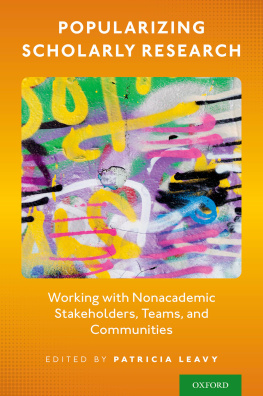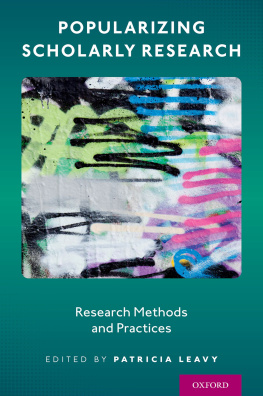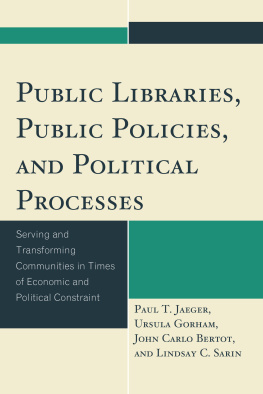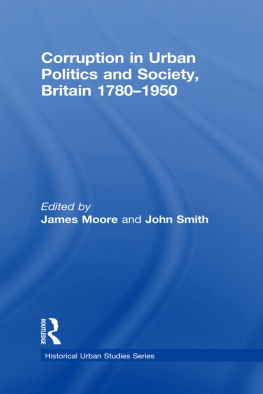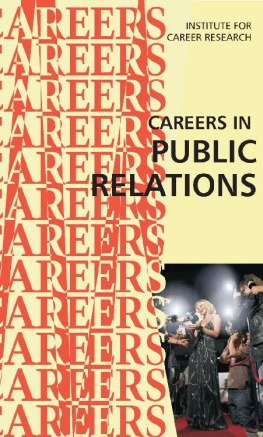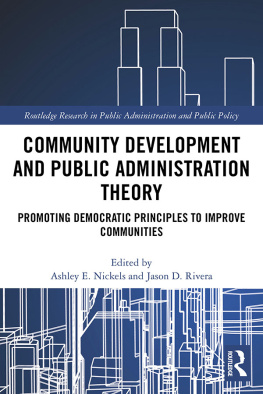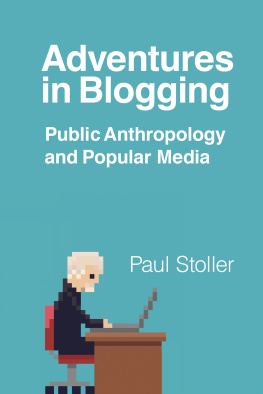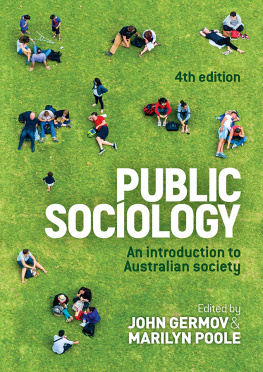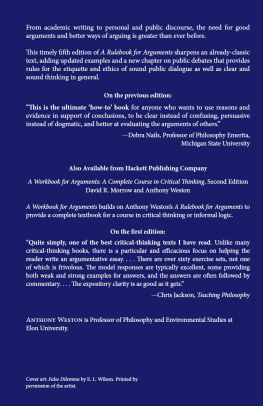Popularizing Scholarly Research: Working with Nonacademic Stakeholders, Teams, and Communities

Oxford University Press is a department of the University of Oxford. It furthers the Universitys objective of excellence in research, scholarship, and education by publishing worldwide. Oxford is a registered trade mark of Oxford University Press in the UK and certain other countries.
Published in the United States of America by Oxford University Press
198 Madison Avenue, New York, NY 10016, United States of America.
Oxford University Press 2022
All rights reserved. No part of this publication may be reproduced, stored in a retrieval system, or transmitted, in any form or by any means, without the prior permission in writing of Oxford University Press, or as expressly permitted by law, by license, or under terms agreed with the appropriate reproduction rights organization. Inquiries concerning reproduction outside the scope of the above should be sent to the Rights Department, Oxford University Press, at the address above.
You must not circulate this work in any other form and you must impose this same condition on any acquirer.
Library of Congress Cataloging-in-Publication Data
Names: Leavy, Patricia, 1975 editor.
Title: Popularizing scholarly research: working with nonacademic
stakeholders, teams, and communities / Patricia Leavy.
Other titles: Oxford handbook of methods for public scholarship. Selections |
Working with nonacademic stakeholders, teams, and communities
Description: New York, NY : Oxford University Press, [2022] |
Includes selected essays originally published in The Oxford handbook of methods
for public scholarship, 2019. | Includes bibliographical references and index.
Identifiers: LCCN 2020058470 (print) | LCCN 2020058471 (ebook) |
ISBN 9780190085193 (paperback) | ISBN 9780190085216 (epub)
Subjects: LCSH: Learning and scholarshipSocial aspects. |
ResearchMethodology. | ResearchSocial aspects.
Classification: LCC AZ362 .O844 2022 (print) | LCC AZ362 (ebook) | DDC 001.2dc23
LC record available at https://lccn.loc.gov/2020058470
LC ebook record available at https://lccn.loc.gov/2020058471
Dedicated to my social media communityvirtual friends, colleagues, muses, warriors
Contents
Patricia Leavy
Adria D. Goodson
Isabel Araiza
Venus E. Evans-Winters, Theresa Y. Robinson, Norris N. Chase, and Teresa Lawrence Jones
Michel P. Pimbert
Margaret Boyd
Caroline Lenette and Natalie Nesvaderani
Jorge Lucero and William Estrada
Joe Norris
Wendy L. Sternberg
Kakali Bhattacharya
Jill Hendrickson Lohmeier and Judith Davidson
Mark R. Landahl, DeeDee M. Bennett, and Brenda D. Phillips
Public scholarship has always existed, to some extent, but has become the focus of debate during the past 25 years. Most simply, public scholarship is that which is available outside of the academy. Lay citizens have access to public scholarship because it circulates in spaces to which they have access and its understandable. Public scholarship isnt merely available to the public or some segment of it, but its also useful to them. Optimally, public scholarship explicitly addresses public needs. Some argue public scholarship should address publicly identified needs. By involving stakeholders in the entire process, and making the findings accessible, public scholars contribute to the democratization of research. Taking all of this into account, I suggest public scholarship is scholarship that circulates outside of the academy in accessible formats and is useful to relevant stakeholders (who may or may not directly participate in shaping research agendas).
In order to do public scholarship, researchers need methodological tools. In 2019, I published The Oxford Handbook of Methods for Public Scholarship, which presents the first comprehensive overview of methods for public scholarship. The handbook provides methodological instruction for engaging in public scholarship. Filled with robust examples from real-world research in different fields, ample discussion of working with nonacademic stakeholders, coverage of traditional methods, or engaging in emergent methods, as well as coverage of key issues such as writing, publicity, and funding, The Oxford Handbook of Methods for Public Scholarship aims to be a valuable text for students, professors, and researchers.
Although the handbook is a valuable tool for many researchers across the disciplines, in order to make the material more accessible for both classroom use and individual researchers, we have taken the content and divided it into three paperback texts, which can be read independently or together. Thinking about how professors teach and what individual researchers may be looking for during various phases of a project or thesis, the content has been divided as follows: Popularizing Scholarly Research: Research Methods and Practices (Vol. 1); Popularizing Scholarly Research: Working with Nonacademic Stakeholders, Teams, and Communities (Vol. 2); and Popularizing Scholarly Research: The Academic Landscape, Representation, and Professional Identity in the 21st Century (Vol. 3). All the original chapters from the handbook remain. In addition to the original content, new material has been added, including introductory material, new chapters in each volume, annotated suggested resources, and research and writing activities for class use.
Patricia Leavy
In the work toward this book I appreciate the assistance and support of a number of people. First and foremost, thank you to everyone at Oxford University Press. In particular, I extend a spirited thank you to my editors Abby Gross and Dana Bliss for guiding and supporting this project, Katharine Pratt for the invaluable pre-production support, and Prabha Karunakaran for the production management. Im extremely grateful to my brilliant assistant Shalen Lowell for all of their help with this project, including the big task of keeping track of the authors. Ultimately, this book is the result of the extraordinary work of the contributorsthey are pushing the field forward. Im honored and humbled to include their wisdom in this collection. Im also indebted to my family for their support. Mark, youre the worlds best spouse. Madeline, you are my light. Over the years Ive been fortunate to have the backing of numerous blogs and websites. Special thanks to Robyn Hussa Farrell for the many years of support. Pubic scholarship requires help and Im thankful for hers. Im profoundly thankful to everyone who has ever published my work online, interviewed me, or shared my work via social media. Finally, cheers to my social media community for all the love and support. Were in this together. This is for you.
PatriciaLeavy, PhD, is an independent scholar and bestselling author. She was formerly Associate Professor of Sociology, Chair of Sociology & Criminology, and Founding Director of Gender Studies at Stonehill College. She has published more than 30 books, earning commercial and critical success in both nonfiction and fiction. Her books have been translated into numerous languages. Her recent titles include Research Design: Quantitative, Qualitative, Mixed Methods, Arts-Based, and Community-Based Participatory Research Approaches; Handbook of Arts-Based Research; Method Meets Art: Arts-Based Research Practice

